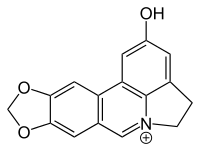Ungeremine
Ungeremine is a betaine-type alkaloid isolated from Nerine bowdenii[1] and related plants such as Pancratium maritimum.[2] Pharmacologically, it is of interest as an acetylcholinesterase inhibitor and accordingly as possibly relevant to Alzheimer's disease.[3] It also has been investigated as a bactericide.[2]
 | |
| Names | |
|---|---|
| IUPAC name
2-Hydroxy-4,5-dihydro[1,3]dioxolo[4,5-j]pyrrolo[3,2,1-de]phenanthridin-6-ium | |
| Identifiers | |
3D model (JSmol) |
|
| ChemSpider | |
PubChem CID |
|
CompTox Dashboard (EPA) |
|
| |
| |
| Properties | |
| C16H12NO3+1 | |
| Molar mass | 266.275 g·mol−1 |
Except where otherwise noted, data are given for materials in their standard state (at 25 °C [77 °F], 100 kPa). | |
| Infobox references | |
References
- Rhee, I. K.; Appels, N; Hofte, B; Karabatak, B; Erkelens, C; Stark, L. M.; Flippin, L. A.; Verpoorte, R (2004). "Isolation of the acetylcholinesterase inhibitor ungeremine from Nerine bowdenii by preparative HPLC coupled on-line to a flow assay system". Biological & Pharmaceutical Bulletin. 27 (11): 1804–9. doi:10.1248/bpb.27.1804. PMID 15516727.
- Schrader, Kevin K.; Avolio, Fabiana; Andolfi, Anna; Cimmino, Alessio; Evidente, Antonio (2013). "Ungeremine and Its Hemisynthesized Analogues as Bactericides against Flavobacterium columnare". Journal of Agricultural and Food Chemistry. 61 (6): 1179. doi:10.1021/jf304586j. PMID 23331165.
- Murray, Ana; Faraoni, Maria; Castro, María; Alza, Natalia; Cavallaro, Valeria (2013). "Natural AChE Inhibitors from Plants and their Contribution to Alzheimer's Disease Therapy". Current Neuropharmacology. 11 (4): 388. doi:10.2174/1570159X11311040004. PMC 3744903. PMID 24381530.
This article is issued from Wikipedia. The text is licensed under Creative Commons - Attribution - Sharealike. Additional terms may apply for the media files.